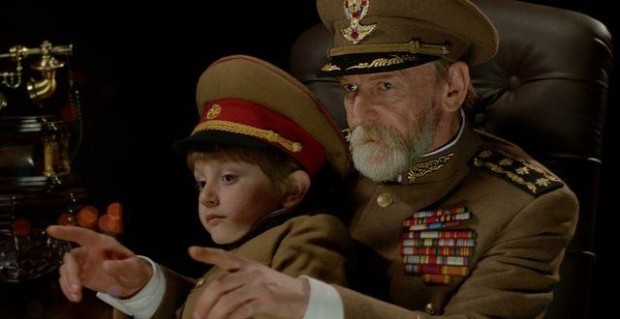“The President”: “Despot-on-the-run” satire with revolutionary revelations

"The President": a “despot-on-the-run” plot exposes a deposed despot and his 5-year-old grandson forced to run for their lives after a civil uprising turned revolutionaries bent on bloody revenge / CINECOLA PHOTO
By Joel Lee
Expat Iranian director Mohsen Makmalbaf proposes a trenchant reenactment of revolutionary developments in the Middle East with his new film “The President,” which premiered at the opening of 2014 Venice Film Festival.
Co-written with his filmmaker wife Marziyeh Meshkiny, the movie is an allegory of a “despot-on-the-run” plot inspired by the Arab Spring and Russia-Ukraine crisis, offering a cinematic didacticism of Third World politics.
The film is set in an unnamed country where a deposed despot and his 5-year-old grandson are forced to run for their lives after a civil uprising. The revolutionaries are bent on bloody revenge.
Meandering through the vicious vicissitudes of a fugitive life, the President comes face-to-face with the miseries and sufferings he has inflicted on his subjects. The following is a synopsis by The Guardian:
“The story concerns an ageing dictator in an unnamed country, known only as the President. When his exhausted regime’s sadism, cynicism and brutality become too much to bear, there is a coup.
“His grotesquely spoilt wife and daughters flee the country but the President is left behind with his adored grandson. The President has always had a mawkish fondness for this boy – a projection of his own infantilized status and pampered privilege.
“They steal ragged clothes and a guitar and the old man and child have to disguise themselves as a travelling street musician and his dancing monkey-boy, and live among the people they oppressed. The bounty on their heads rises inexorably and all the time they fear discovery and violent death at the hands of a newly disloyal military which the President indoctrinated in savagery.”
The film was shot in Georgia, where civil protests over the rigged parliamentary elections led to a change of power, forcing President Eduard Shevardnadze to resign in what is known as the “Rose Revolution” of Nov 2003.
The story seems to allude to the civil unrest arising out of Ukraine, as the country was swarmed by waves of pro-Russian, anti-government protests in major cities across the eastern and southern regions in early 2014.
With a “no-sympathy-for-vengeance” attitude, the last scene of the movie resonates the tragic ending of late Libyan leader Muammar Gaddafi and late Iraqi President Saddam Hussein.
Jay Weissberg of entertainment magazine Variety said: “Despite being designed as allegory, the lack of subtlety reduces the lessons to platitudes. Makhmalbaf’s usually intelligent handling of childhood’s state of grace versus the adult world’s corruption is reduced to its most basic formula, so the grandson’s stream of ingenuous questions – ‘What is death?’ ‘What is torture?’ becomes merely tedious. The helmer also seems to be aiming for certain Lear-like parallels, yet the age of philosopher kings is long past.”
Makhmalbaf received the 18th “Manhae Peace Award” – prize given to individuals who have promoted freedom and peace commemorating the spirit of late Korean intellect and anti-Japanese independence fighter “Manhae” Han Yong-un (1879–1944).
Makhmalbaf is the second Iranian citizen to receive the award after Nobel Peace Prize laureate Shirin Ebadi who won it in 2003.
The 57-year-old Tehran-born film director is also a writer, producer and human rights activist. His celebrated cinematographic resume expands over 20 feature films and documentaries that won over 50 awards worldwide. His most famous, “Kandahar,” won the Federico Fellini Prize from UNESCO in 2001 and was selected as one of 100 greatest films of all time by TIME Magazine.
Makhmalbaf left Iran in 2005 shortly after former President Mahmoud Ahmadinejad took power and has since acquired French citizenship in exile.
He fought against the imperial autocracy under the last Shah of Iran – Mohammad Reza Shah Pahlavi – during the 1970s, and spent five years in prison where he underwent torture. He also claimed to have read between 2,000 and 3,000 books inside the prison.
“After the 1979 Iranian Revolution succeeded, some of my friends who fought against the government went into politics.” he said. “But I didn’t think politics had changed. The dictator stepped down, but that doesn’t mean we achieved democracy. I wanted to genuinely influence people through film to create real change.”
“I wrote about my experience of being tortured, working at ice-cream parlors and sweatshop factories, writing one manuscript a week through sleepless nights. I materialize those writings into live images in the film,” he added.
“If you know too much, you become fearful. If you know nothing, you become fearless.”
About his family, which includes two professional filmmakers — his wife and daughter — he said: “My family enjoys making films together. There is no set path in creating a film. With no previous shooting experience, I mastered it through my own life experiences.”
He added that there are many Iranians in exile under death threats by the current regime in Iran. Despite the danger, Makhmalbaf says he plans to continue the fight for human rights in Afghanistan, Tajikistan and Iran.





















































